


























A Professional Development Programme for Singers
Designed and led by National Concert Hall
Artist-in-Residence Tara Erraught
Monday 10 February – Friday 14 February 2025
NATIONAL CONCERT HALL
2024 — 2025 SEASON
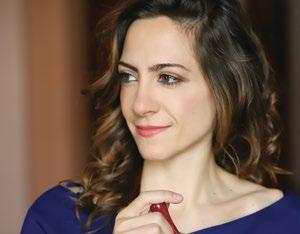
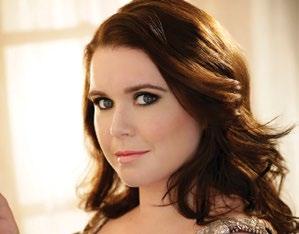
ARTIST-IN-RESIDENCE
mezzo-soprano
National Symphony Orchestra | Clelia Cafiero conductor
Programme includes Mozart, Donizetti, Puccini, Bellini & Rossini
THURSDAY 1 MAY 2025, 7.30PM
University Concert Hall, Limerick
In association with the University Concert Hall
FRIDAY 2 MAY 2025, 7.30PM
National Concert Hall
Book now on nch.ie Tickets from €15

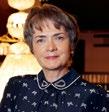
Welcome to Celebrating the Voice, our five-day professional development programme for young singers at advanced stages of vocal development, designed and led by Tara Erraught, the internationally acclaimed Irish mezzosoprano and a National Concert Hall Artist-in-Residence for the current season.
Collaborating with Tara on this programme as a central element of her work as an Artist-in-Residence has been a great pleasure and a priority for the National Concert Hall. It is another instance of our broader commitment to providing learning opportunities and platform opportunities for young artists as they look towards building a career and to doing so with artists, such as Tara, who bring a wealth of experience at this critical juncture in a young artist’s development.
Developing the programme to ensure a Main Stage public performance with the National Symphony Orchestra, with the esteemed Anu Tali conducting, is a valuable added dimension and one we have been delighted to create.
Tara is an international artist and the calibre of industry experts participating is testament to the high regard in which she is held. Working closely with our Learning & Participation and National Symphony Orchestra teams, these young singers have had the opportunity to work closely with these industry experts over a range of events this week. We hope this has been a tremendously exciting week for them, and one we hope will carry them further along in their careers and in life.
Tara’s generosity of spirit and commitment are to be lauded. We are very proud to work with her.
We hope you enjoy this performance.
Robert Read
Maura McGrath CEO Chairperson

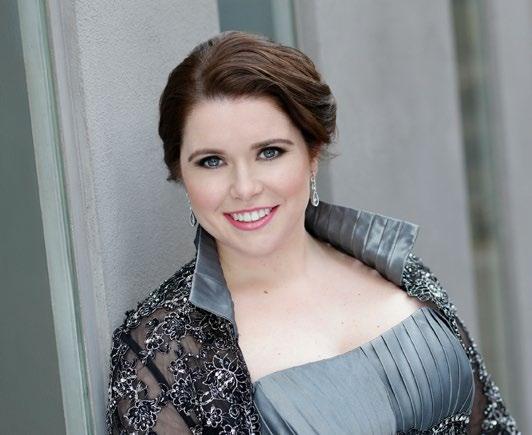
It is with deep joy that I welcome you all to the culmination of the third iteration of Celebrating the Voice, taking place in the National Concert Hall for the first time as part of my work as Artist-in-Residence for the current season.
I initiated Celebrating the Voice in conjunction with Drogheda Classical Music in 2020 for singers from the north-east of Ireland. It is a deeply personal endeavour for me and I could not be prouder now to expand it to benefit incredible young singers from all over the country.
Singing is a challenging pursuit. It demands all from an individual. Truly great performance requires that singers be vocal athletes, extraordinary musicians, enthralling actors, and skilled linguists. A deep understanding of vocal health, musical, technical, and interpretive skills are all necessary to protect and hone a singer’s ability.
However, the voice is but one element needed to succeed. Singers must also deal with the business of singing. Business management and industry knowledge are all essential if one is to survive and flourish. Having benefitted myself from the tutelage and guidance of many stalwarts of the industry, I recognised the need to share the lessons I was so lucky to learn.
I have gathered a group of illustrious industry experts, with whom I have had the great pleasure of working, from all over the world. This extraordinary group are leaders in their fields, and I am so grateful they agreed to come and share their vast knowledge with the talented young singers, marvellous teachers, and devoted music lovers of Ireland.
Celebrating the Voice would not be possible without all the wonderful friends and colleagues who have come together to make it happen. My most sincere thanks to them, especially to our visiting experts, and to the entire National Concert Hall and National Symphony Orchestra teams for their devoted work on this project.
Tara Erraught
Industry Experts in order of appearance
Tara Erraught Mezzo-soprano and 2024-2025 NCH Artist-in-Residence
Dearbhla Collins Pianist, Artistic Director of the Veronica Dunne International Singing Competition, Head of Artistic Administration at the National Opera Studio; and Vocal Coach at the Royal Irish Academy of Music
Morgane Fauchois Pianist and Head Vocal Coach of Opera Productions at the Paris Conservatoire
Dr. Paul E. Kwak Laryngologist and laryngeal surgeon at the NYU Voice Center and world authority on vocal health
Liz Nolan Presenter, RTÉ lyric fm
Alexander Neef Director General of the Paris Opera
Gaby Smyth Financial and tax consultant specializing in literary, music, film, theatre and visual arts
Andreas Massow Artist Manager and former Casting Director at the Bavarian State Opera, Frankfurt Opera, and Zurich Opera
Anu Tali Conductor, Music Director of the Nordic Symphony Orchestra
Recital Singers
Eiméar Harper soprano
Éadaoin Hassett soprano
Bláthnaid Nicholson soprano
Ellen Mawhinney soprano
Diana Salop mezzo-soprano
Anna-Helena Maclachlan mezzo-soprano
Patrick McGinley tenor
David Kennedy baritone
Opera Gala Singers
Ami Hewitt soprano
Deirdre Higgins soprano
Maria Matthews soprano
Cathal McCabe tenor
Monday 10 February 2025
10.30am Kevin Barry Recital Room
Masterclass – Opera: Tara Erraught, Dearbhla Collins and Morgane Fauchois with Opera Gala singers.
3pm Kevin Barry Recital Room
Masterclass – Song: Tara Erraught, Dearbhla Collins and Morgane Fauchois with Recital singers.
7.30pm Kevin Barry Recital Room
Talk: Vocal Health and Voice Care with Dr. Paul E. Kwak. Moderated by Liz Nolan, RTÉ lyric fm.
Tuesday 11 February 2025
10.30am Kevin Barry Recital Room
Masterclass – Song: Tara Erraught, Dearbhla Collins and Morgane Fauchois with Recital singers
3pm Kevin Barry Recital Room
Masterclass – Opera: Tara Erraught, Dearbhla Collins and Morgane Fauchois with Opera Gala singers.
7.30pm Kevin Barry Recital Room
Keynote Conversation: Alexander Neef in conversation with Tara Erraught. Moderated by Liz Nolan, RTÉ lyric fm.
Wednesday 12 February 2025
4.45pm Kevin Barry Recital Room
Conversation: Tara Erraught, Dearbhla Collins and Morgane Fauchois in conversation with all participating singers. Moderated by Liz Nolan, RTÉ lyric fm.
7pm Kevin Barry Recital Room
Talk: Accountancy and Personal Business Management for Artists with Gaby Smyth.
Thursday 13 February 2025
3pm Kevin Barry Recital Room
Conversation: Andreas Massow in conversation with Liz Nolan, RTÉ lyric fm.
7pm Kevin Barry Recital Room
Panel Discussion: Building a Career in the Vocal Arts, From Every Perspective
Tara Erraught with Dearbhla Collins, Morgane Fauchois, Dr. Paul E. Kwak, Gaby Smyth, and Andreas Massow, joined by conductor Anu Tali and Cathy Stokes, National Symphony Orchestra Concerts & Planning Manager. Moderated by Liz Nolan, RTÉ lyric fm.
NATIONAL CONCERT HALL
2024 — 2025 SEASON
INTERNATIONAL ORCHESTRAS AND RECITALS
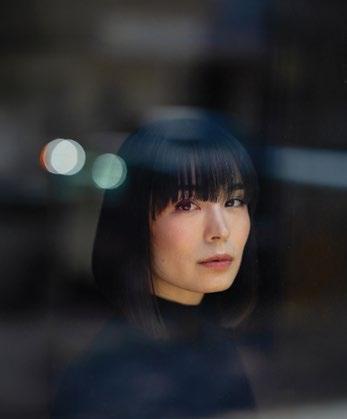
Programme includes John Field and Beethoven
An exciting and groundbreaking artist, German/Japanese pianist Alice Sara Ott will perform works by Irish composer John Field and Beethoven. Her recital is part of a 17-city European tour celebrating the release of hew new album (DG) ‘John Field: The Complete Nocturnes’.
THURSDAY 27 FEBRUARY 8PM
Tickets from €15
Discounts and Packages Available nch.ie
Eiméar Harper soprano | Éadaoin Hassett soprano
Ellen Mawhinney soprano | Bláthnaid Nicholson soprano
Anna-Helena Maclachlan mezzo-soprano | Diana Salop mezzo-soprano
Patrick McGinley tenor | David Kennedy baritone
Dearbhla Collins piano | Morgane Fauchois piano
Friday 14 February 2025, 1.05pm
John Field Room, National Concert Hall
Presented by Liz Nolan, RTÉ lyric fm Programme
Schubert Gretchen am Spinnrade
Debussy La romance d’Ariel
Schubert ‘Erstarrung’ (from Winterreise), D. 911, No. 4
Bachelet Chère nuit
Duparc Chanson triste
Schubert Erlkönig , D. 328
Brahms Liebeslieder Waltzes , Op. 52
PLEASE NOTE: The NCH does not permit photography or videography during the performance (without prior permission). We kindly ask you to refrain from using any recording equipment for the duration of tonight’s performance.
NCH Board Members
Maura McGrath Chair | James Cavanagh | Cliona Doris
Rebecca Gageby | Hilary Hough | Peter McKenna
Niamh Murray | Michelle O’Sullivan | Don Thornhill
Patron Michael D. Higgins President of Ireland
Franz Schubert (1797-1828)
Gretchen am Spinnrade, Op. 2, D. 118
Anna-Helena Maclachlan mezzo-soprano
Shortly before his 18th birthday in 1814, Schubert set a passage from Goethe’s Faust that, at a stroke, elevated the hitherto lowly German Lied into an art form.
Gretchen am Spinnrade (Gretchen at the Spinning Wheel ) finds the eponymous, luckless young woman contemplating her future after her recent seduction by the elderly scholar Faust, unaware that he has sold his soul to the Devil to secure her affections. Ever-alert to telling, dramatic details, Schubert fashioned a miniature portrait-in-triptych in which Gretchen variously bemoans her current confusion and despondency, conjures recollections of romantic encounters with Faust, and relives the ecstatic rush of their first kiss.
All the while, the original piano accompaniment provides a telling commentary on Gretchen’s mercurial emotions even as it mimics the gyrating spin of the wheel (interrupted only, momentarily, poignantly, by the heart-stopping memory of the kiss) and the rhythmic tapping of Gretchen’s foot on its treadle.
Gretchen am Spinnrade (Johann Wolfgang von Goethe, 1749-1832)
Meine Ruh’ ist hin, Mein Herz ist schwer, Ich finde sie nimmer Und nimmermehr.
Wo ich ihn nicht hab’ Ist mir das Grab, Die ganze Welt Ist mir vergällt.
Mein armer Kopf Ist mir verrückt
Gretchen at the Spinning Wheel (Trans. © Richard Stokes)
My peace is gone My heart is heavy; I shall never Ever find peace again.
When he’s not with me, Life’s like the grave; The whole world Is turned to gall.
My poor head Is crazed,
Mein armer Sinn Ist mir zerstückt.
Meine Ruh’ ist hin, Mein Herz ist schwer, Ich finde sie nimmer Und nimmermehr.
Nach ihm nur schau’ ich Zum Fenster hinaus, Nach ihm nur geh’ ich Aus dem Haus.
Sein hoher Gang, Sein’ edle Gestalt, Seines Mundes Lächeln, Seiner Augen Gewalt.
Und seiner Rede Zauberfluss.
Sein Händedruck, Und ach, sein Kuss!
Meine Ruh’ ist hin, Mein Herz ist schwer, Ich finde sie nimmer Und nimmermehr.
Mein Busen drängt sich Nach ihm hin. Ach dürft’ ich fassen Und halten ihn.
Und küssen ihn So wie ich wollt’
An seinen Küssen Vergehen sollt’!
My poor mind Shattered.
My peace is gone My heart is heavy; I shall never Ever find peace again.
It’s only for him I gaze from the window, It’s only for him I leave the house.
His proud bearing His noble form, The smile on his lips, The power of his eyes,
And the magic flow Of his words, The touch of his hand, And ah, his kiss!
My peace is gone My heart is heavy; I shall never Ever find peace again.
My bosom Yearns for him. Ah! if I could clasp And hold him,
And kiss him To my heart’s content, And in his kisses Perish!
Richard Stokes is author of The Book of Lieder (Faber & Faber, 2005).
Claude Debussy (1862-1918)
La romance d’Ariel
Eiméar Harper soprano
In the mid-1830s Debussy set five poems by the five-times Nobel Prize-nominated poet and novelist Paul Bourget. Alluding to Shakespeare’s The Tempest, it finds the spirit Ariel attempting to entice Prospero’s daughter, Miranda, with the intoxicating scents and sights of nature. Written for the soprano Marie-Blanche Vasnier – with whom Debussy shared some degree of intimacy, dedicating 29 songs to her – it makes much of what seems to have been her light, lyrical voice capable of moments of rapturous ecstasy.
La romance d’Ariel (Paul Bourget, 1852-1935)
Au long de ces montagnes douces, Dis! viendras-tu pas à l’appel
De ton délicat Ariel
Qui veloute à tes pieds les mousses?
Suave Miranda, je veux
Qu’il fasse juste assez de brise
Pour que ce souffle tiède frise
Les pointes d’or de tes cheveux!
Les clochettes des digitales
Sur ton passage tinteront;
Les églantines sur ton front Effeuilleront leurs blancs pétales.
Sous le feuillage du bouleau
Blondira ta tête bouclée; Et dans le creux de la vallée
Tu regarderas bleuir l’eau,
L’eau du lac lumineux ou sombre,
Miroir changeant du ciel d’été,
Ariel’s Song (Trans. © Richard Stokes)
Come, will you not cross these fair mountains, When summoned by Your fair Ariel, Who velvets the moss at your feet?
Sweet Miranda, I would wish
For just enough breeze
For its warm breath to ruffle
The golden tips of your hair!
The foxglove bells
Will chime as you pass;
The eglantine will shed on your brow
Its white petals.
Beneath the birch leaves
Your curly head will turn blond; And in the depths of the valley
You will see the water turn blue,
The water of the luminous or dark lake, A changing mirror of the summer sky,
Qui sourit avec sa gaîté
Et qui s’attriste avec son ombre;
Symbole, hélas! du cœur aimant, Où le chagrin, où le sourire
De l’être trop aimé, se mire
Gaîment ou douloureusement….
Which smiles in merriment And grows sad in its shadow;
Symbol, alas, of the loving heart, Where the sorrow, where the smile Of one too well loved, is reflected Merrily or sadly….
Richard Stokes is author of A French Song Companion (Oxford University Press, 2000).
Franz Schubert (1797-1828)
‘Erstarrung’ (from Winterreise), D. 911, No. 4
Ellen Mawhinney soprano
Composed in 1827, the year before his death at the age of 31, Schubert’s majestic late song cycle, Winterreise (Winter Journey ), is a bleak tale of a forlorn young man stricken by the loss of his beloved to another, who tries to salve his pain by wandering aimlessly.
The cycle’s fourth song, ‘Erstarrung’ (‘Numbness’), finds him alone in a wintry meadow where once they walked together in Spring. Now covered by snow, he looks in vain for her footsteps, the landscape as frozen as his heart. The agitated piano accompaniment eloquently inks in the feeling of inner turmoil.
Erstarrung
(Wilhelm Müller, 1794-1827)
Ich such’ im Schnee vergebens
Nach ihrer Tritte Spur, Wo sie an meinem Arme
Durchstrich die grüne Flur.
Ich will den Boden küssen,
Durchdringen Eis und Schnee
Mit meinen heissen Tränen,
Bis ich die Erde seh’.
Numbness ( Trans. © Richard Wigmore)
In vain I seek her footprints in the snow, where she walked on my arm through the green meadows.
I will kiss the ground and pierce ice and snow with my burning tears, until I see the earth.
Wo find’ ich eine Blüte, Wo find’ ich grünes Gras?
Die Blumen sind erstorben,
Der Rasen sieht so blass.
Soll denn kein Angedenken
Ich nehmen mit von hier?
Wenn meine Schmerzen schweigen,
Wer sagt mir dann von ihr?
Mein Herz ist wie erstorben,
Kalt starrt ihr Bild darin:
Schmilzt je das Herz mir wieder,
Fliesst auch ihr Bild dahin.
Where shall I find a flower? Where shall I find green grass?
The flowers have died, the grass looks so pale.
Shall I, then, take no memento from here? When my sorrows are stilled who will speak to me of her?
My heart is as dead, her image coldly rigid within it; if my heart ever melts again her image, too, will flow away.
NATIONAL CONCERT HALL 2024 — 2025 SEASON
Irish Premiere
National Symphony Orchestra
David Hill conductor
Christopher Purves baritone
National Symphony Chorus
David Young choral director
Chamber Choir Ireland
Paul Hillier choral director
FRIDAY 18 APRIL 2025, 3.30pm
Main Stage, National Concert Hall
Tickets from €15 nch.ie
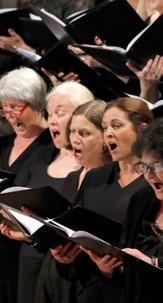
Alfred Bachelet (1864-1944)
Chère nuit
Éadaoin Hassett soprano
Alfred Bachelet was conductor of the Opéra national de Paris and long-serving director of the Nancy Conservatory. Twice winner of the Grand Prix de Rome, he wrote his best known song, Chère nuit (Fair night ) for the legendary Australian soprano, Nellie Melba in 1897. It’s an opulent chanson with operatic leanings tributing the beauty of the night whose lush harmonies surely owe something, even if only glancingly, to Wagner.
Chère nuit
(Eugène Adénis-Colombeau, 1854-1923)
Voici l’heure bientôt.
Derrière la colline
Je vois le soleil qui décline
Et cache ses rayons jaloux.
J’entends chanter l’âme des choses,
Et les narcisses et les roses
M’apportent des parfums plus doux!
Chère nuit aux clartés sereines,
Toi qui ramènes
Le tendre amant,
Ah! descends et voile la terre
De ton mystère
Calme et charmant.
Mon bonheur renaît sous ton aile, Ô nuit plus belle
Que les beaux jours:
Ah! lève-toi! pour faire encore
Briller l’aurore
De mes amours!
Fair Night (Trans. © Richard Stokes)
Night will soon be here.
Behind the hill
I see the sun set
And hide its jealous rays.
I hear Nature’s soul singing, And the narcissi and roses
Bring me sweeter scents!
Fair night of serene brightness, You who bring back
The tender lover, Ah! descend and veil the earth
With your tranquil, bewitching Mystery.
My happiness is reborn beneath your wing, O night more beautiful
Than beautiful days: Ah! arise, that once more
The dawn might Glitter with my love!
Henri Duparc (1848-1933)
Chanson Triste
Diana Salop mezzo-soprano
Chanson Triste (Sad Song) was one of five songs Duparc composed in 1868 for voice and piano which he later orchestrated in 1912. Setting a text by Jean Lahor – nom de plume of Henri Cazalis, whose poem Dance macabre was later to inspire Saint-Saëns – it carries itself with an almost Wagnerian intensity. Duparc instructs the voice to be ‘tender and intimate… sweet and magical’ but daringly stretches its range as he punctuates it with broken chords and accompanies it with adventurous harmonies.
Chanson Triste (Jean Lahor, 1840-1909)
Dans ton cœur dort un clair de lune,
Un doux clair de lune d’été, Et pour fuir la vie importune, Je me noierai dans ta clarté.
J’oublierai les douleurs passées, Mon amour, quand tu berceras
Mon triste cœur et mes pensées
Dans le calme aimant de tes bras.
Tu prendras ma tête malade,
Oh! quelquefois sur tes genoux, Et lui diras une ballade
Qui semblera parler de nous;
Et dans tes yeux pleins de tristesses, Dans tes yeux alors je boirai
Tant de baisers et de tendresses
Que peut-être je guérirai.
Song of Sadness (Trans. © Richard Stokes)
Moonlight slumbers in your heart, A gentle summer moonlight, And to escape the cares of life I shall drown myself in your light.
I shall forget past sorrows, My sweet, when you cradle My sad heart and my thoughts In the loving calm of your arms.
You will rest my poor head, Ah! sometimes on your lap, And recite to it a ballad That will seem to speak of us;
And from your eyes full of sorrow, From your eyes I shall then drink So many kisses and so much love That perhaps I shall be healed.
Franz Schubert (1797-1828)
Erlkönig , D. 328
David Kennedy baritone
Composed in an afternoon in 1815, the 18-year-old Schubert revised Erlkönig (The Erlking) three times over the next six years but was confident about its quality to eventually publish it as his Opus 1. A bold statement, not least given he had composed more than 140 Lieder the same year.
Setting a ballad poem drawn from Danish folk legend by Johann Wolfgang von Goethe, it is a work of virtuosic and theatrical bravura; a large-scale drama condensed into four epic minutes. Suitably so for an extreme, nightmare-laced drama in which the narrator relates the efforts of a father to protect his son in vain from the enticements of the titular Erlking, a predatory supernatural creature of the woods. All of the characters are given individual voices in a cinematically sceneshifting tour de force.
Erlkönig, D. 328
(Johann Wolfgang von Goethe, 1749-1832)
Wer reitet so spät durch Nacht und Wind?
Es ist der Vater mit seinem Kind:
Er hat den Knaben wohl in dem Arm, Er fasst ihn sicher, er hält ihn warm.
“Mein Sohn, was birgst du so bang dein Gesicht?”
“Siehst, Vater, du den Erlkönig nicht?
Den Erlenkönig mit Kron’ und Schweif?”
“Mein Sohn, es ist ein Nebelstreif.”
“Du liebes Kind, komm, geh mit mir!
Gar schöne Spiele spiel’ ich mit dir; Manch’ bunte Blumen sind an dem Strand, Meine Mutter hat manch gülden Gewand.”
The Erlking (Trans. © Richard Wigmore, 2005)
Who rides so late through the night and wind?
It is the father with his child.
He has the boy in his arms; he holds him safely, he keeps him warm.
“My son, why do you hide your face in fear?”
“Father, can you not see the Erlking? The Erlking with his crown and tail?”
“My son, it is a streak of mist.”
“Sweet child, come with me.
I’ll play wonderful games with you.
Many a pretty flower grows on the shore; my mother has many a golden robe.”
“Mein Vater, mein Vater, und hörest du nicht, Was Erlenkönig mir leise verspricht?”
“Sei ruhig, bleibe ruhig, mein Kind: In dürren Blättern säuselt der Wind.”
“Willst, feiner Knabe, du mit mir gehn?
Meine Töchter sollen dich warten schön;
Meine Töchter führen den nächtlichen Rein
Und wiegen und tanzen und singen dich ein.”
“Mein Vater, mein Vater, und siehst du nicht dort
Erlkönigs Töchter am düstern Ort?”
“Mein Sohn, mein Sohn, ich seh es genau: Es scheinen die alten Weiden so grau.”
“Ich liebe dich, mich reizt deine schöne Gestalt;
Und bist du nicht willig, so brauch ich Gewalt.”
“Mein Vater, mein Vater, jetzt fasst er mich an!
Erlkönig hat mir ein Leids getan!”
Dem Vater grausets, er reitet geschwind,
Er hält in Armen das ächzende Kind,
Erreicht den Hof mit Mühe und Not:
In seinen Armen das Kind war tot.
“Father, father, do you not hear what the Erlking softly promises me?”
“Calm, be calm, my child: the wind is rustling in the withered leaves.”
“Won’t you come with me, my fine lad? My daughters shall wait upon you; my daughters lead the nightly dance, and will rock you, and dance, and sing you to sleep.”
“Father, father, can you not see Erlking’s daughters there in the darkness?”
“My son, my son, I can see clearly: it is the old grey willows gleaming.”
“I love you, your fair form allures me, and if you don’t come willingly, I’ll use force.”
“Father, father, now he’s seizing me! The Erlking has hurt me!”
The father shudders, he rides swiftly, he holds the moaning child in his arms; with one last effort he reaches home; the child lay dead in his arms.
Johannes Brahms (1833-97)
Liebeslieder Waltzes, Op. 52
Eiméar Harper soprano | Éadaoin Hassett soprano
Ellen Mawhinney soprano | Bláthnaid Nicholson soprano
Anna-Helena Maclachlan mezzo-soprano | Diana Salop mezzo-soprano
Patrick McGinley tenor | David Kennedy baritone
Dearbhla Collins primo | Morgane Fauchois secondo
Brahms composed two sets of songs titled Liebeslieder Waltzes setting folk songs and love poems by the poet and philosopher, Georg Friedrich Daumer. It is likely they were written in the frustrated realisation that his infatuation with Clara Schumann could go no further, although her marriage to fellow composer, Robert, had ended with his early death more than a decade previously.
Both sets were written for four voices and piano duet, and true to their name marry the love song to the waltz. They are, in effect, miniature exercises – many of the 18 songs in the Op. 52 set last less than a minute, the longest just two and a half minutes – in musical miscegenation and mood. Himself an accomplished pianist, Brahms sets them all in the waltz’s 3/4 time signature but adroitly varies their melodic style and keys, the balance between male and female voices, and the highlighting of individual voices within quartet pieces. The result is a bewitching amalgam of attitude and ardour.
Liebeslieder Waltzes
(Georg Friedrich Daumer, 1800-75)
Rede, Mädchen, allzu liebes, Op. 52 No. 1
Rede, Mädchen, allzu liebes,
Das mir in die Brust, die kühle, Hat geschleudert mit dem Blicke
Diese wilden Glutgefühle!
Willst du nicht dein Herz erweichen, Willst du, eine Überfromme, Rasten ohne traute Wonne, Oder willst du, dass ich komme?
Tell me, my sweetest girl
Tell me, my sweetest girl, who with your glances have kindled in my cool breast these wild, passionate feelings!
Will you not relent, will you, with an excess of virtue, live without love’s rapture, or do you wish me to come to you?
Rasten ohne traute Wonne, Nicht so bitter will ich büssen.
Komme nur, du schwarzes Auge, Komme, wenn die Sterne grüssen!
Am Gesteine rauscht die Flut, Op. 52 No. 2
Am Gesteine rauscht die Flut Heftig angetrieben; Wer da nicht zu seufzen weiss, Lernt es unterm Lieben.
O die Frauen, o die Frauen , Op. 52 No. 3
O die Frauen, o die Frauen,
Wie sie Wonne tauen!
Wäre lang ein Mönch geworden,
Wären nicht die Frauen!
Wie des Abends schöne Röte, Op. 52 No. 4
Wie des Abends schöne Röte Möcht ich arme Dirne glühn, Einem, Einem zu gefallen, Sonder Ende Wonne sprühn.
Die grüne Hopfenranke, Op. 52 No. 5
Die grüne Hopfenranke
Sie schlängelt auf der Erde hin.
Die junge, schöne Dirne, So traurig ist ihr Sinn!
Du höre, grüne Ranke!
Was hebst du dich nicht himmelwärts?
Du höre, schöne Dirne!
Was ist so schwer dein Herz?
Wie höbe sich die Ranke
Der keine Stütze Kraft verleiht?
Wie wäre die Dirne fröhlich, Wenn ihr der Liebste weit?
To live without love’s rapture, is a bitter fate I would not suffer.
Come, then, with your dark eyes, come, when the stars beckon!
The wildly lashed waves
The wildly lashed waves dash against the rocks; whoever has not learnt to sigh will learn it when he loves.
O women, o women
O women, o women, how they delight the heart!
I should have long since turned monk, were it not for women!
Like a lovely sunset
Like a lovely sunset I, a humble girl, would glow, and find favour with one alone, radiating endless rapture.
The green tendrils of the vine
The green tendrils of the vine creep low along the ground.
How gloomy, too, the lovely young girl looks!
Why, green tendrils!
Why do you not stretch up to the sky? Why, lovely girl!
Why is your heart so heavy?
How can the vine grow tall without support?
How can the girl be joyful, when her lover’s far away?
Ein kleiner, hübscher Vogel , Op. 52 No. 6
Ein kleiner, hübscher Vogel nahm den Flug
Zum Garten hin, da gab es Obst genug.
Wenn ich ein hübscher, kleiner Vogel wär, Ich säumte nicht, ich täte so wie der.
Leimruten-Arglist lauert an dem Ort; Der arme Vogel konnte nicht mehr fort.
Wenn ich ein hübscher, kleiner Vogel wär, Ich säumte doch, ich täte nicht wie der.
Der Vogel kam in eine schöne Hand,
Da tat es ihm, dem Glücklichen, nicht and.
Wenn ich ein hübscher, kleiner Vogel wär, Ich säumte nicht, ich täte doch wie der.
Wohl schön bewandt war es , Op. 52 No. 7
Wohl schön bewandt
War es vorehe
Mit meinem Leben, Mit meiner Liebe!
Durch eine Wand,
Ja, durch zehn Wände, Erkannte mich
Des Freundes Sehe.
Doch jetzo, wehe, Wenn ich dem Kalten
Auch noch so dicht,
Vorm Auge stehe, Es merkts sein Auge,
Sein Herze nicht.
Wenn so lind dein Auge mir, Op. 52 No. 8
Wenn so lind dein Aug mir
Und so lieblich schauet –
Jede letzte Trübe fliehet, Welche mich umgrauet.
Dieser Liebe schöne Glut,
Lass sie nicht verstieben!
Nimmer wird, wie ich, so treu
Dich ein andrer lieben.
A pretty little bird
A pretty little bird flew off into a garden full of fruit. Were I a pretty little bird, I’d not hesitate, I’d do the same. But treacherous lime-twigs lay in wait; the poor bird could not fly away. Were I a pretty little bird, I’d hesitate, not do the same. The bird alighted on a fair hand, the lucky thing wanted nothing more. Were I pretty little bird, I’d not hesitate, I’d do the same.
All seemed rosy All seemed rosy at one time with my life, with my love!
Through a wall, through ten walls, my lover’s gaze would reach me. But now, alas, I stand in front of his cool gaze, neither his eyes, nor his heart, takes note of me.
When you gaze at me so tenderly When you gaze at me so tenderly and so full of love –all the gloom that assails me fades away.
Oh, do not let this love’s sweet ardour vanish!
No one will love you as truly as I.
Am Donaustrande, Op. 52 No. 9
Am Donaustrande, da steht ein Haus,
Da schaut ein rosiges Mädchen aus. Das Mädchen, es ist wohl gut gehegt,
Zehn eiserne Riegel sind vor die Türe gelegt.
Zehn eiserne Riegel – das ist ein Spass!
Die spreng ich, als wären sie nur von Glas.
O wie sanft die Quelle, Op. 52 No. 10
O wie sanft die Quelle sich
Durch die Wiese windet!
O wie schön, wenn Liebe sich, Zu der Liebe findet!
Nein, es ist nicht auszukommen , Op. 52 No. 11
Nein, es ist nicht auszukommen
Mit den Leuten; Alles wissen so giftig Auszudeuten.
Bin ich heiter, hegen soll ich
Lose Triebe;
Bin ich still, so heissts, ich ware Irr, aus Liebe.
Schlosser auf, und mache Schlösser, Op. 52 No.12
Schlosser auf, und mache Schlösser, Schlösser ohne Zahl!
Denn die bösen Mäuler will ich Schliessen allzumal.
Vögelein durchrauscht die Luft, Op. 52 No. 13 Vögelein durchrauscht die Luft, Sucht nach einem Aste; Und das Herz ein Herz begehrts, Wo es selig raste.
On the Danube’s shore
On the Danube’s shore there stands a house, from its windows a rosy girl looks out. The girl is excellently guarded, ten bolts are fixed to her door. Ten bolts of iron – a mere trifle! I’ll break them down, as though they were glass.
Ah, how gently the stream Ah, how gently the stream meanders through the meadow! Ah, how sweet, when love finds itself requited!
No, it is not possible No, it is not possible to put up with these people; they interpret everything so spitefully.
If I’m happy, they say I harbour lewd desires; if I’m quiet, they say I’m madly in love
Locksmith, come, make me padlocks Locksmith, come, make me padlocks, padlocks without number! So that once and for all I can shut their malicious mouths.
A little bird flies through the skies
A little bird flies through the skies, searching for a branch; thus does one heart seek another, where it might rest in bliss.
Sieh, wie ist die Welle klar, Op. 52 No. 14
Sieh, wie ist die Welle klar, Blickt der Mond hernieder!
Die du meine Liebe bist, Liebe du mich wieder.
Nachtigall, sie singt so schön , Op. 52 No. 15
Nachtigall, sie singt so schön, Wenn die Sterne funkeln –Liebe mich, geliebtes Herz, Küsse mich im Dunkeln!
Ein dunkeler Schacht ist Liebe, Op. 52 No. 16
Ein dunkeler Schacht ist Liebe, Ein gar zu gefährlicher Bronnen; Da fiel ich hinein, ich Armer, Kann weder hören, noch sehn. Nur denken an meine Wonnen, Nur stöhnen in meinen Wehn.
Nicht wandle, mein Licht, Op. 52 No. 17
Nicht wandle, mein Licht, dort außen
Im Flurbereich!
Die Füsse würden dir, die zarten, Zu nass, zu weich.
All überströmt sind die Wege, Die Stege dir, So überreichlich tränte dorten Das Auge mir.
Es bebet das Gesträuche, Op. 52 No. 18
Es bebet das Gesträuche, Gestreift hat es im Fluge
Ein Vöglein.
In gleicher Art erbebet, Die Seele mir erschüttert
Von Liebe, Lust und Leide, Gedenkt sie dein.
See how clear the waves are
See how clear the waves are, when the moon shines down! You, my dearest love, love me in return.
The nightingale sings so sweetly
The nightingale sings so sweetly, when the stars are sparkling –Love me, dear heart, kiss me in the dark!
Love is a dark pit
Love is a dark pit, an all too dangerous well; I tumbled in, alas, can neither hear nor see, can only recall my rapture, and only bemoan my grief.
Do not wander, my love
Do not wander, my love, out there in the fields!
The ground would be too wet for your tender feet.
The paths and tracks are all flooded out there, so abundantly have my eyes been weeping.
The foliage trembles, The foliage trembles, where a bird in flight has brushed against it. And so my soul trembles too, shuddering with love, desire and pain, whenever it thinks of you.
Eiméar Harper soprano
Eiméar Harper is a Wicklow-born coloratura soprano. She made her operatic debut in the role of Gretel in Humperdinck’s Hansel and Gretel with Lyric Opera Ireland. Other roles include Mary Crawford in the Irish premiere of Jonathan Dove’s Mansfield Park , Cousin in Madama Butterfly and Yum-Yum in The Mikado at the National Concert Hall. She has also joined the chorus of Irish National Opera for their 2024-2025 season. As a concert soloist, Eiméar has performed with Le Foyer des Artistes, Sestina Music and Lyric Opera Ireland. Eiméar was the winner of the Gervase Elwes Memorial Cup at Feis Ceoil 2024.
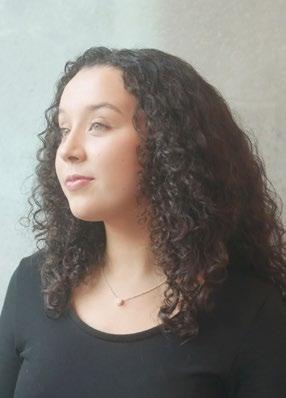
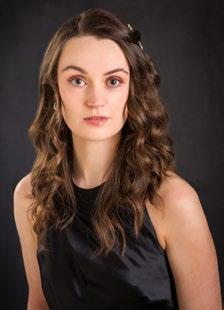
Éadaoin Hassett soprano Irish soprano Éadaoin Hassett hails from Co. Kildare. Having graduated from the Bachelor’s degree in Vocal Performance at the Royal Irish Academy of Music with First-Class Honours, Éadaoin continues her studies at the RIAM on the Master’s degree in Vocal Performance. There, she was a student of the late Prof. Mary Brennan. Éadaoin now receives her principal vocal tuition from Virginia Kerr, and vocal coaching from Andrew Synnott, Dearbhla Collins and Brenda Hurley. Recent professional engagements include singing as Soprano Soloist in Mozart’s Coronation Mass with Diva Voces, Dublin, and various roles in Purcell’s The Fairy Queen in collaboration with Sligo Baroque Music Festival, London Handel Players and the Croatian Baroque Orchestra, with performances in Korcˇula, Croatia and Sligo, Ireland.
Ellen Mawhinney soprano
Soprano Ellen Mawhinney studied at the Royal Conservatoire of Scotland and has now graduated from the Royal Academy of Music Opera School after studying with Kate Paterson and Ingrid Surgenor. Ellen is the winner of Northern Ireland Opera’s Young Opera Voice of the Year award, the Deborah Voigt Prize at Northern Ireland Opera’s Festival of Voice, and the inaugural Charles Wood Song Competition. She has been a featured live artist on BBC Radio 3’s In Tune and spotlight recitalist for Classical Connections with BBC Radio Ulster. She is a Leeds Lieder Young Artist, a Josephine Baker Trust Artist and a member of the Academy Song Circle. In 2024 she was a fellow young artist at the Toronto International Song Festival with her duo partner. She is the grateful recipient of the John Talbot Collender Award. With the Royal Academy of Music, she performed the role of Countess Almaviva in Le nozze di Figaro, Ginevra in Handel’s Ariodante, Miss Wordsworth in Britten’s Albert Herring , and Josephine in Martinu˚’s Comedy on the Bridge. Other operatic performances include Falsirena in La fiera di Venezia with Bampton Opera, Annina in La traviata and Chorus in Die Fledermaus with Northern Ireland Opera, and Alice in Wonderland with Opera Collective Ireland.
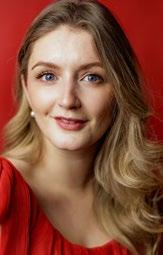
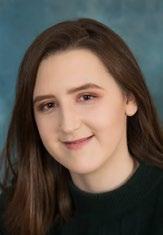
Bláthnaid Nicholson soprano
Bláthnaid Nicholson is a soprano from Co. Kildare with First Class Honours from University College Dublin in both BA Music and Drama and Bachelor of Music. She is currently studying with Orla Boylan, James Smidt and Aoife O’Sullivan. Some recent engagements include Clorinda in Rossini’s La Cenerentola , La Zia in Puccini’s Madama Butterfly, Julia Bertram in Dove’s Mansfield Park , and cover for Lurline in Wallace’s Lurline. She was a member of the Irish National Opera Chorus in their productions of Berlioz’s Béatrice et Bénédict and Verdi’s La traviata , and in the BVOF Chorus in their recent productions of Verdi’s Macbeth and Gluck’s Orfeo ed Euridice. Bláthnaid has represented the Blackwater Valley Opera Festival at their recitals in conjunction with The Castlemartyr Resort and Waterford Whisky Distillery in 20232024, and performed a Young Artist Recital as part of Boyle Arts Festival 2022.
Anna-Helena Maclachlan mezzo-soprano
Anna-Helena Maclachlan is a mezzo-soprano from Westmeath, Ireland. She is currently enrolled in Royal Academy Opera at the Royal Academy of Music, London. Anna-Helena studies with Susan Waters and Jonathan Papp. She previously graduated from the Royal Irish Academy of Music with a First Class Honours Bachelor’s degree. Anna-Helena has a variety of experience on the opera, song and oratorio platforms. Upcoming engagements include Hänsel in Humperdinck’s Hänsel und Gretel and Third Lady in Mozart’s Die Zauberflöte with Royal Academy Opera. AnnaHelena is currently a recipient of the 2024 Blackwater Valley Opera Festival Bursary. At the Royal Academy of Music she is also a recipient of the Knights of the Round Table Award and the Charles Mackerras Opera Scholarship.
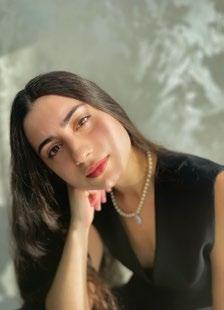

Diana Salop mezzo-soprano
Diana Salop is a third-year student at TU Dublin Conservatoire pursuing a Bachelor’s degree in vocal performance under Mairéad Buicke. Throughout her years of studying music she has participated in many festivals and concerts, achieving great success in competitions, most notably at Feis Ceoil and within TU Dublin Conservatoire. Diana was a member of the Irish national broadcaster choir, RTÉ Cór Linn. She also has experience as a soloist with vocal ensembles and has been involved with various other chamber music. Additionally, Diana attended the Oxenfoord International Summer School in Scotland in 2024, where she performed in masterclasses and had coaching sessions with some of Britain’s most prolific vocal coaches.
Patrick McGinley tenor
Patrick McGinley is a tenor from Donegal. He first began music lessons at the age of six, eventually attending Maynooth University to study piano. He joined the Maynooth University Chamber Choir, where he fell in love with and decided to focus on singing. He was a member of Anúna for four years, performing around the world including on Japanese television and the BBC’s Last Night of the Proms. Since then, he has focused on the classical repertoire, working professionally in both opera and choral music with Irish National Opera, Northern Ireland Opera, The Ulster Consort, Sestina, and as a soloist in C.V. Stanford’s Stabat Mater with the RTÉ Concert Orchestra.
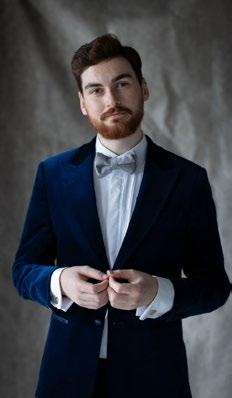

David Kennedy baritone
Irish baritone David Kennedy, from Galway, is an INO Studio member for the 2024-2025 season. He recently performed Belcore in L’elisir d’amore and Silvio in Pagliacci at Wexford Opera Festival 2024 as part of the Factory. He was the first Irish scholar at the Heidelberger Frühling Liedakademie, studying under Thomas Hampson in 2022-2023 and 2023-2024. He also trained at LIEDBasel with Julius Drake and Ian Bostridge. Concert highlights include performing at Berlin’s Pierre Boulez Saal with Susan Manoff during Schubert Week 2024. David was a semi-finalist at the Wigmore Hall/Bollinger International Song Competition 2024. He is grateful for the primary mentorship he receives from Owen Gilhooly-Miles, Dearbhla Collins, and Brenda Hurley.

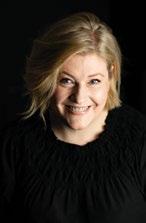
Jessica Cottis conductor
Karen Cargill mezzo-soprano
Samuel Sakker tenor
Ailís Ní Ríain The Land Grows Weary of its Own Irish Premiere.
NSO co-commission with BBC Radio 3 and Manchester International Festival.
Mahler Das Lied von der Erde (The Song of the Earth)
“CARGILL’S VOICE IS A REMARKABLE COLUMN OF SOUND THAT IS EVEN FROM TOP TO BOTTOM” (New York Classical Review)
FRIDAY 21 FEBRUARY 2025, 7.30pm

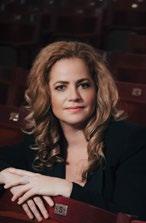
RAVEL: A BIRTHDAY CELEBRATION
Speranza Scappucci conductor
Julie Boulianne mezzo-soprano
Lionel Lhote baritone
On the very day of the 150th anniversary of his birth, we celebrate the genius of Maurice Ravel with a ‘greatest hits’ selection of evergreen works including Ma mère l’Oye (Mother Goose) Suite, Don Quichotte à Dulcinée and of course, Boléro.
“BOULIANNE… IS THE ONE TO WATCH... HER VOICE HAS BOTH SWEETNESS AND BITE” (Toronto Globe and Mail)
FRIDAY 7 MARCH 2025, 7.30pm
See nch.ie

National Symphony Orchestra
Anu Tali conductor
Ami Hewitt soprano
Deirdre Higgins soprano
Maria Matthews soprano
Cathal McCabe tenor
Tara Erraught mezzo-soprano
Friday 14 February 2025, 7.30pm
National Concert Hall
Presented by Liz Nolan , RTÉ lyric fm
Programme
Mozart Le nozze di Figaro Overture
Mozart ‘Sull’aria… che soave zeffiretto’ (Le nozze di Figaro)
Mozart ‘Ach, ich liebte, war so glücklich’ (Die Entführung aus dem Serail)
Donizetti La favorite Overture
Donizetti ‘Una furtiva lagrima’ (L’elisir d’ amore)
Donizetti ‘Caro elisir! Sei mio!’ (L’elisir d’ amore)
Bellini I Capuleti e i Montecchi Overture
Bellini ‘Qui la voce sua soave’ (I puritani)
Bellini ‘Mira, o Norma’ (Norma)
Dvorˇák ‘Song to the Moon’ (Rusalka)
Offenbach ‘Galop Infernal’ (Orpheus in the Underworld)
Verdi ‘Parigi, o cara’ (La traviata)
Rossini ‘Nacqui all’affanno e al pianto...Non più mesta’ (La Cenerentola)
Recorded for deferred broadcast on RTÉ lyric Live on RTÉ lyric fm
Wolfgang Amadeus Mozart (1756-91)
Le nozze di Figaro Overture
There are legions of admirers who would declare Mozart’s playful but profound The Marriage of Figaro the perfect opera. Based on a banned play by Beaumarchais – in which the libidinous Count Almaviva plots to seduce the fiancée of his eponymous servant but is thwarted by an unlikely coalition between his wife and their servants – it was first heard in 1786.
Composed in just two days, the exhilarating and admirably economic Overture positively bristles with energy, wit and glorious music that, surprisingly, does not appear later in the opera, with flighty woodwinds gloriously to the fore.
Wolfgang Amadeus Mozart (1756-91)
‘Sull’aria… che soave zeffiretto’ (Le nozze di Figaro)
Deirdre Higgins soprano & Maria Matthews soprano
The ravishing duettino ‘Sull’aria… che soave zeffiretto’ (‘On the air… what a sweet breeze’) – sung by the Countess and her maid, Susanna (betrothed to fellow servant, Figaro, but pursued by Count Almaviva) – depicts the moment in which the wronged wife plots the downfall of her licentious husband. A moment that could, perhaps, be described as an act of proto-feminism, it is as light and airy as the gentle breeze the title alludes to and provides one of the most beautiful soprano pairings in all opera.
‘Sull’aria… che soave zeffiretto’
(Lorenzo Da Ponte, 1749-1838)
SUSANNA
Sull’aria…
COUNTESS
Che soave zeffiretto…
SUSANNA
Zeffiretto…
COUNTESS
Questa sera spirerà…
SUSANNA
Questa sera spirerà…
COUNTESS
Sotto i pini del boschetto.
SUSANNA
Sotto i pini?
Sotto i pini del boschetto.
COUNTESS
Ei già il resto capirà.
SUSANNA
Certo, certo il capirà.
‘To the zephyr… how sweet the breeze’
SUSANNA
To the zephyr…
COUNTESS
How sweet the breeze…
SUSANNA
The breeze…
COUNTESS
Will be this evening…
SUSANNA
Will be this evening…
COUNTESS
In the pine grove.
SUSANNA
In the pine grove?
In the pine grove.
COUNTESS
The rest he’ll understand.
SUSANNA
Certainly, certainly he’ll understand.
Wolfgang Amadeus Mozart (1756-91)
‘Ach, ich liebte, war so glücklich’ (Die Entführung aus dem Serail)
Ami Hewitt soprano
Mozart’s Die Entführung aus dem Serail (The Abduction from the Seraglio) is strictly speaking a singspiel – a comic-romantic operatic genre in which spoken dialogue is prominent. It is one of the composer’s most exotic creations, set as it is in the palace of a 16th-century Turkish Pasha. The plot involves the attempts by Belmonte to rescue his beloved Constanze who has been abducted by pirates and sold to the Pasha. In ‘Ach, ich liebte, war so glücklich’ (‘Ah, I was in love, and so happy’) Constanze resists the entreaties of the enamoured Turkish dignitary and ruefully sings of her love for Belmonte whom she fears she will never see again.
‘Ach, ich liebte, war so glücklich’ (Gottlieb Stephanie, 1741-1800)
Ach, ich liebte, War so glücklich, Kannte nicht der Liebe Schmerz; Schwur ihm Treue, Dem Geliebten, Gab dahin mein ganzes Herz.
Doch wie schnell schwand meine Freude, Trennung war mein banges Los; Und nun schwimmt mein Aug’ in Tränen, Kummer ruht in meinem Schoss.
‘Ah, I was in love, and so happy’
Ah, I was in love, and so happy, knowing nothing of the pain of love; I swore to be true to my beloved and I gave him all my heart.
But how quickly my joy vanished; separation was my unhappy fate. and now my eyes overflow with tears, Sorrow dwells in my breast.
Gaetano Donizetti (1797-1848)
La favorite Overture
Loosely based on real characters, the titular favourite of Donizetti’s grand opera – one of more than 70 he composed – is Lenora, caught at the centre of a love triangle involving the King of Castile and her lover, Fernando. As if that wasn’t enough for her to deal with, the struggles between church and state and the Moorish invasions of her native Spain against which the ménage à trois plays out are never far from the surface. The Overture balances the unfolding romance and drama with bracing intensity and immediacy.
Gaetano Donizetti (1797-1848)
‘Una furtiva lagrima’ (L’elisir d’ amore)
Cathal McCabe tenor
Although written at speed in just six weeks in 1832, L’elisir d’amore (The Elixir of Love) proved hugely successful. In the decade to 1848 it was the most performed opera in Italy and has remained a popular fixture in the repertoire ever since. Thanks in no small part to the ardent tenor romanza ‘Una furtiva lagrima’ (‘A furtive tear’). Besotted by wealthy landowner Adina, the lowly peasant Nemorino purchases a love potion to seduce her. Seeing her weeping, he mistakenly assumes the elixir has worked and that she, too, now feels the same way about him.
‘Una furtiva lagrima’ (Felice Romani, 1788-1865)
Una furtiva lagrima negli occhi suoi spuntò: Quelle festose giovani invidiar sembrò: che più cercando io vo?
M’ama, sì, m’ama. lo vedo, lo vedo. Un solo istante i palpiti del suo bel cor sentir! I miei sospir confondere per poco a’ suoi sospir!
Cielo, si può morir; di più non chiedo, si può morir d’amor.
‘A furtive tear’
A furtive tear
Welled up in her eye…
Those carefree girls she seemed to envy… Why should I look any further?
She loves me, yes, she loves me, I can see it, I can see it.
To feel for just one moment the beating of her dear heart!
To blend my sighs For a little with hers! Heavens, I could die; I ask for nothing more, I could die of love.
Gaetano Donizetti (1797-1848)
‘Caro elisir! Sei mio!’ (L’elisir d’ amore)
Having purchased a love potion in his desperation to have the wealthy Adina return the feelings he has for her, the peasant Nemorino can’t resist trying the elixir that promises so much himself. Believing in its potency – blissfully unaware it is but cheap red wine purchased from a quack doctor – in ‘Caro elisir! Sei mio!’ (‘Dear Elixir! You are mine!’) he convinces himself that it is having an affect and muses on how it will transform Adina, unaware that she is eavesdropping on his intoxicated reverie.
Caro elisir! Sei mio!
(Felice Romani, 1788-1865)
Caro elisir! Sei mio!
Sí, tutto mio…
Com’esser dee possente la tua virtù, se, non bevuto ancora, di tanta gioia già mi colmi il petto!
Ma perché mai l’effetto non ne poss’io vedere prima che un giorno inter non sia trascorso? Bevasi.
Oh! buono! Oh! caro! un altro sorso.
Ah! qual di vena in vena dolce calor mi scorre! Ah! forse anch’essa, forse la fiamma istessa incomincia a sentir Certo la sente, me l’annunzia la gioia e l’appetito che in me si risvegliò tutto in un tratto.
Dear Elixir, you are mine
Dear Elixir! You are mine!
Yes, all mine…
How powerful your strength must be
If, without having drunk any yet, You fill my breast with so much joy!
But why ever can’t I see any effect until a whole day
Has gone by?
Let’s drink.
Oh, it’s good! Oh, it’s lovely! Another sip.
Oh what a pleasant warmth flows through my veins!
Oh, perhaps she too, perhaps she will begin
To feel the same fire.
Of course she will feel it.
The happiness and hunger
That have suddenly awakened in me tell me so.
Vincenzo Bellini (1801-35)
I Capuleti e i Montecchi Overture
Bellini packed a lot into his 34 years, completing 10 operas and leaving another unfinished at the rate of one per year in the last decade of his life. Despite such impressive productivity, there was nothing formulaic about his music which balances head and heart in operas that proved to be high-water marks of 19th-century bel canto (‘beautiful singing’ or ‘beautiful song’).
Composed over four weeks in 1830, I Capuleti e i Montecchi re-tells the Romeo and Juliet story drawn from an earlier Italian opera and play rather than the more familiar version by Shakespeare. Still central is the woeful tale of ‘star-cross’d lovers’ caught between their feuding families. The Overture is a richly orchestrated traversal through the opera’s principal themes and moments.
Vincenzo Bellini (1801-35)
‘Qui la voce sua soave’ (I puritani)
Maria Matthews soprano
A tale of love and political intrigue against the background of feuding Roundheads and Royalists during the English Civil War, I puritani (The Puritans) was a sensation at its 1835 premiere and became the talk of Paris. It was to be Bellini’s last opera, his death aged 33 following nine months later. At its centre is Elvira, in love with the Cavalier Lord Arturo but betrothed by her father to the Puritan leader, Riccardo. As events unfurl and the victorious Riccardo captures then sentences Arturo to death, Elvira descends (as so many 19th-century opera heroines did) into madness. It’s in this confused state she sings ‘Qui la voce sua soave’ (‘His soft voice called me’), an achingly beautiful cavatina (‘little song’).
‘Qui la voce sua soave’ (Carlo Pepoli, 1796-1881)
Qui la voce sua soave mi chiamava… e poi sparì.
Qui giurava esser fedele, qui il giurava, e poi crudele, mi fuggì!
Ah, mai più qui assorti insieme nella gioia dei sospir. Ah! rendetemi la speme, O lasciatemi morir.
Vien, diletto, è in ciel la luna!
Tutto tace intorno intorno; Finchè spunti in cielo il giorno, vien, ti posa sul mio cor!
Deh!, t’affretta, o Arturo mio, riedi, o caro, alla tua Elvira: Essa piange e ti sospira, vien, o caro, all’amore.
Vincenzo Bellini (1801-35)
‘Mira, o Norma’ (Norma)
‘Here his sweet voice’
Here his sweet voice Called me… and then vanished.
Here he swore tone true, Here he swore it, And then, cruel man, he fled!
Ah! Never more shall we share the rapture Of the joys of desire.
Ah! Give me back hope, Or let me die.
Come, beloved, the moon is in the sky! Everything is silent; Until the dawn breaks in the sky, Come, rest on my heart! Come, hasten, oh my Arturo, Return, oh my darling, to your Elvira; She feels and longs for you, Come, oh my darling, to your love.
Deirdre Higgins soprano | Maria Matthews soprano
Set in Gaul during an uprising against the Roman occupation in the century before the birth of Christ, Norma is one of the defining operas of the bel canto era. First seen in Milan in 1831, it employs an operatic staple: the contested love triangle. Here, it involves the Druidic High-priestess, Norma, the Roman Proconsul Pollione (with whom Norma has two children), and the young priestess, Adalgisa. And true to opera it doesn’t end well for the hapless heroine. Desperate to protect her children (having considered murdering them in their sleep), Norma begs Adalgisa to marry Pollione and take them to Rome. Adalgisa refuses, insisting she will try to persuade Pollione to marry Norma.
In ‘Mira, o Norma’ (‘Look, o Norma’) she renounces Pollione to Adalgisa as both confess their troubled feelings to each other.
‘Mira, o Norma’ (Felice Romani, 1788-1865)
ADALGISA
Mira, o Norma, ai tuoi ginocchi
Questi cari tuoi pargoletti.
Ah! pietade di lor ti tocchi, Se non hai di te pietà…
NORMA
Ah! perché la mia costanza
Vuoi scemar con molli affetti?
Più lusinghe, oh più speranza
Presso a morte un cor non ha…
ADALGISA
Mira questi cari pargoletti,
Questi cari, ah, li vedi, ah!
ADALGISA ED NORMA
Mira, o Norma, a’ tuoi ginocchi
Questi cari tuoi pargoletti.
Ah! Pietade di lor ti tocchi, se non hai di te pietà!
NORMA
Ah! perché la mia costanza
Vuoi scemar con molli affetti?
Più lusinghe, oh più speranza
Presso a morte un cor non ha…
ADALGISA ED NORMA
Sì, fino all’ore estreme
Compagna tua m’avrai. Per ricovrarci insieme, Ampia è la terra assai.
Teco del fato all’onte Ferma opporrò la fronte, Finchè il tuo core a battere
O senta sul mio cor, sì.
‘See, o Norma’
ADALGISA
See, o Norma, at your knees,
These dear, dear children. Let pity for them move you, If you feel no pity for yourself…
NORMA
Ah, why do you try to weaken me
With such soft feelings?
Such illusions, such hopes Are not for one about to die.
ADALGISA
Look at these beloved children, These darling ones, ah… See them, ah!
ADALGISA AND NORMA
See, oh Norma, before you kneeling, your dear children, so sweetly pleading. Ah, let your pity be strong and move you, though you may not pity yourself.
NORMA
Ah, why do you try to weaken me
With such soft feelings?
Such illusions, such hopes
Are not for one about to die.
ADALGISA AND NORMA
’Till all our days are over, I will be your close companion. So we’ll be safe together.
We’ll find our place, our place on earth. Facing outrageous fortune, Firmly we’ll keep on fighting, As long as your heart is beating, Beating just like mine, yes!
Antonín Dvor ák (1841-1904)
‘Song to the Moon’ (Rusalka)
Deirdre Higgins soprano
In Dvorˇák’s 1901 fairy-tale opera Rusalka the titular water nymph finds herself transformed into human form after falling in love with a prince. Subsequently scorned, she transforms into a spirit of death. Later, a chance encounter with the prince leads to a kiss that claims his life and Rusalka, bereft and alone, returns to the watery depths. The opera’s most popular aria, ‘Song to the Moon’ is infused with a sublime, yearning beauty as Rusalka, newly smitten by the handsome prince, implores the ‘silver moon upon the deep dark sky’ to tell her beloved of her heart’s desire.
Song to the Moon (Jaroslav Kvapil, 1868-1950)
M e ˇ síc ˇ ku na nebi hlubokém, sve ˇ tlo tvé daleko vidí, po sve ˇ te ˇ bloudíš širokém, díváš se v p r íbytky lidí.
M e ˇ síc ˇ ku, post u ˚ j chvíli, r ˇekni mi, kde je m u ˚ j milý?
R ˇ ekni mu, st r ˇíbrný m e ˇ síc ˇ ku , mé že jej objímá rám e ˇ , aby si alespo n ˇ chvili c ˇ ku, vzpomenul ve sn ení na m e.
Zasve ˇ t’ mu do daleka, r ˇekni mu, kdo tu na n ˇ c ˇ eká!
O mn eˇ-li duše lidská sní, a t’ se tou vzpomínkou vzbudí!
M e ˇ síc ˇ ku, nezasni!
Oh moon in the velvet heavens, Your light shines far, You roam over the wide world, Gazing into human dwellings. O moon, stay a while!
Tell me where my beloved is.
Tell him, silver moon, That my arms enfold him, The perhaps, at least for a moment He will dream of me.
Shine on him, wherever he may be.
Tell him of the one who awaits him here! If a human soul should dream of me, May he awake with that thought. O moon, do not fade away!
Jacques Offenbach (1819-90)
‘Galop Infernal’ (Orpheus in the Underworld)
It takes a while to get there, but when it does you’ll instantly recognise the ‘Galop Infernal’ as the music, first appropriated by the Moulin Rouge and Folies Bergère cabaret venues in Paris, that serves as the driving accompaniment to the once daring can-can dance. It is a high point of Offenbach’s first opera, a tongue firmly in cheek lampoon on the ancient myth of Orpheus in the Underworld. The Infernal Galop takes place on the banks of the River Styx, the boundary between the living and the dead, during a party hosted by the gods as a little too much ambrosia and nectar gives way to unabashed abandon.
Giuseppe Verdi (1813-1901)
‘Parigi, o cara’ (La traviata)
Ami Hewitt soprano | Cathal McCabe tenor
Adapting a novel by Alexandre Dumas, La traviata (The Fallen Woman) is the heartbreaking tale of Violetta, whose love for Alfredo meets with the staunch disapproval of his family. ‘Parigi, o cara’ (‘Paris, my dear’) is a haunting duet between the afflicted lovers, speaking of their mutual adulation and hopes for a blissful shared future even while its music seems to hint at darker, more troubled times ahead as Violetta’s failing health worsens.
Parigi, o cara
(Francesco Maria Piave, 1810-76)
ALFREDO
Parigi, o cara, noi lascerem
La vita uniti trascorreremo.
De’ corsi affanni compenso avrai, La tua salute rifiorirà.
Sospiro e luce tu mi sarai, Tutto il futuro ne arriderà.
VIOLETTA
Parigi, o cara, noi lasceremo
La vita uniti trascorreremo.
De’ corsi affanni compenso avrai, La tua salute rifiorirà.
Sospiro e luce tu mi sarai, Tutto il futuro ne arriderà.
Paris, my dear
ALFREDO
From Paris, my dear, we shall go away, To spend our lives together. We shall have make up for past troubles, Your health will bloom again. You will be the light of my life, The future will smile on us.
VIOLETTA
From Paris, my dear, we shall go away, To spend our lives together. We shall have make up for past troubles, Your health will bloom again. You will be the light of my life, The future will smile on us.
Gioachino Rossini (1792-1868)
‘Nacqui all’affanno… Non più mesta’ (La Cenerentola)
Tara Erraught mezzo-soprano
Composed, legend has it, in not much more than three weeks, La Cenerentola was the 25-year-old Rossini’s 20th opera. Based on Charles Perrault’s late 17th-century fairy tale Cendrillon (a re-telling of the Cinderella story), Rossini’s ‘drama with jokes’ boasts one of the truly great mezzo-soprano roles – its title character – in all opera. In ‘Nacqui all’affanno… Non più mesta’ (‘I was born to sorrow and tears… No more sadness’) from the opera’s final scene, Angelina (aka Cinderella) reflects on her new-found happiness with Prince Ramiro, and welcoming the sudden transformation of her life, vows to forgive her step-sisters for mistreating her.
‘Nacqui all’affanno… Non più mesta’
(Jacopo Ferretti, 1784-1852)
CENERENTOLA
Nacqui all’affanno, al pianto, Soffrì tacendo il core; Ma per soave incanto
Dell’età mia nel fiore, Come un baleno rapido La sorte mia cangiò.
No, no; tergete il ciglio, Perchè tremar, perchè?
A questo sen volate; Figlia, sorella, amica, Tutto trovate in me.
Padre… Sposo… Amico… oh istante!
Non più mesta accanto al fuoco
Starò sola a gorgheggiar.
Ah, fu un lampo, un sogno, un giuoco
Il mio lungo palpitar.
‘I was born to sorrow and tears…
No more sadness’
I was born to sorrow and tears, I suffered with a silent heart;
But by some sweet enchantment, In the flower of my youth, Swift as a flash of lightning, My fortune has changed. No, no, dry your tears; Why do you tremble, why?
Fly to my breast; Daughter, sister, friend, All of them you can find in me.
Father… husband… friend… oh, what
A moment! No longer sad beside the fire
Shall I sit alone, singing.
Ah, my long years of heartache
Were but a streak of lightning, a dream, a game.

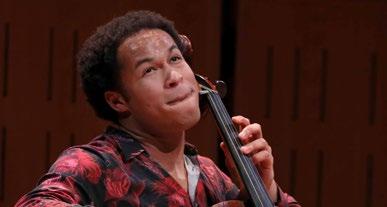
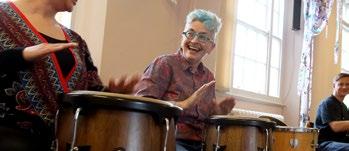
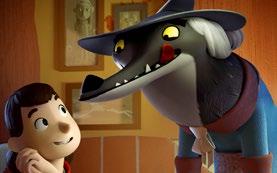
Go spreaga an ceol tú. Bain sult as ceol binn sa Cheoláras Náisiúnta. Is leatsa an Ceol. Is leatsa an Ceoláras Náisiúnta. nch.ie
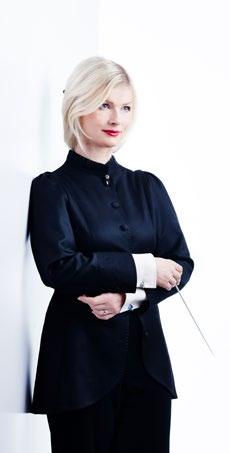
Anu Tali conductor
Described by the Herald Tribune as ‘charismatic, brilliant, energetic’, Anu Tali is one of the most captivating and versatile conductors on the international scene today, an artist whose pursuit of fresh and ingenious artistic creativity is acclaimed worldwide by critics and public alike.
Highlights of the 2024-2025 season include a production of Peer Gynt with the Orchestre de chambre de Paris; a production of The Pirate’s Queen at the Nederlandse Reisopera; concerts with the Dallas Symphony Orchestra, the St. Gallen Symphony Orchestra, the National Symphony Orchestra, Dublin, the BBC Scottish Symphony Orchestra, as well as concerts with her Nordic Symphony Orchestra in Tallinn.
Former Music Director of the Sarasota Orchestra in Florida, Anu Tali appears regularly with orchestras worldwide including the New Japan and Tokyo Philharmonic orchestras, Orchestre National de France, Houston Symphony Orchestra, Mozarteumorchester Salzburg and the Swedish Radio Symphony Orchestra. In Germany she has worked with the Deutsches Symphonieorchester Berlin, Konzerthausorchester Berlin, Deutsche Kammerphilharmonie Bremen and Ensemble Modern.
In opera, Tali has had major success in the production of Gluck’s Telemaco with the Freiburger Barockorchester at the Schwetzingen Festival and Theater Basel. Another notable highlight includes acclaimed semi-staged performances of Goebbels’ Songs of Wars I Have Seen with ensembles including the London Sinfonietta at New York’s Lincoln Center, London’s Southbank Centre, and in Saint Paul/Minnesota, Seattle and Barcelona. In 2021, she made history as the first woman to conduct an opera at the Teatro de la Maestranza in Seville, in the Calixto Bieito production of Carmen.
Ami Hewitt soprano
Ami Hewitt is a soprano from Dublin, Ireland. Her recent roles include Elvira in Rossini’s L’italiana in Algeri and Lauretta in Puccini’s Gianni Schicchi at Wexford Festival Opera, The Controller in Dove’s Flight with Opera Collective Ireland, Sophie in Lyric Opera Ireland’s production of Massenet’s Werther, and Kitty in Retrospect Opera’s recording of Stanford’s Shamus O’Brien with the orchestra of Scottish Opera conducted by David Parry. Ami was a studio member with INO, a young artist with Wexford Festival Opera, and a member of the young singers collective with Le Foyer des Artistes. She is currently participating in a concert tour of France and Italy with Opera for Peace.
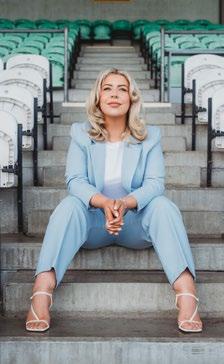
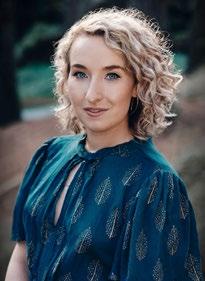
Deirdre Higgins soprano
Soprano Deirdre Higgins is in her second year at the Irish National Opera Studio and looks forward to her Irish National Opera debut this summer, where she will sing Giannetta in Donizetti’s L’elisir d’amore. She has also worked with Wexford Festival Opera, and in 2024 performed Eileen O’Doherty in the premiere of Caruso’s Lady Gregory in America. Deirdre has received many awards including the Gervase Elwes Memorial Cup (2023), Birr Lion’s Club Bursary (2023) and the Bernadette Greevy Bursary (2024). In July 2024 Deirdre made her debut with the National Symphony Orchestra as part of its Summer Lunchtime Concert Series at the National Concert Hall.
Maria Matthews soprano
Maria Matthews is an Irish soprano and graduate of the TU Dublin Conservatoire of Music and Drama. She also holds a Master of Music from the Royal Conservatoire of Scotland. Maria is a Wexford Opera Festival Factory Artist for the 2024-2025 season when she will perform the roles of Nedda in Leoncavallo’s Pagliacci and both Adina and Giannetta in Donizetti’s L’elisir d’amore. Maria performs regularly with Irish National Opera as a chorus member, most recently in their productions of Gounod’s Faust, Puccini’s La bohème and Verdi’s La traviata. In opera scenes Maria has portrayed roles including: Mimì (La bohème), Fiordiligi (Così fan tutte), Countess Almaviva (Le nozze di Figaro) and Ellen Orford (Peter Grimes). Maria took part in the 2021 Raise Our Voices and 2023 Celebrating the Voice concert series, both curated by Irish mezzo-soprano Tara Erraught. In 2021 she was the winner of the Birr Lions Vocal Bursary in conjunction with the Trench Award, and in 2023 Maria was a Camerata Ireland Young Artist and a Voice Fellow at Opernfest Prague where she had the opportunity to sing with the Prague Philharmonic Orchestra in Smetana Hall.
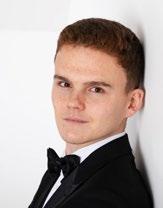
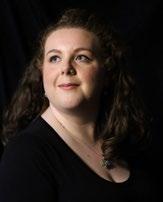
Cathal McCabe tenor
Cathal McCabe is a tenor from Dublin. He is a Studio Artist with Irish National Opera for the 2024-2025 season. He obtained a First Class honours from the TU Dublin Conservatoire of Music and Drama, where he received the Michael McNamara award for the highest performance mark, as well as the Anne Leahy award for highest dissertation mark. In 2023, he won the Song Prize at Northern Ireland Opera’s Glenarm Festival of Voice. He has won multiple awards at the Feis Ceoil, including the John McCormack Cup, the Dermot Troy Cup, and the Count John McCormack Recital Medal. Cathal performs regularly with Irish National Opera and Northern Ireland Opera. In 2024, he will sing the role of Shouter No. 1 in Lady Gregory in America at Wexford Festival Opera. He sang the role of Nanki-Poo in Gilbert and Sullivan’s The Mikado in the National Concert Hall, and the role of Henry Crawford in the Irish premiere of Jonathan Dove’s Mansfield Park

Tom O’Brien Managing Partner
Forvis Mazars is your dedicated strategic partner throughout your business journey.
Whether you’re experiencing rapid growth, assessing risks and opportunities or expanding into international markets, our team of expert financial advisors, tax specialists and audit partners offer invaluable insights and solutions tailored to your unique needs.
Together, let’s pave the way to success.
Move forward with Forvis Mazars.
Tara Erraught is one of the leading international singers whose versatile repertoire ranges from the Baroque to Mozart, the bel canto repertoire, romantic and contemporary music.
In the 2024-2025 season, Tara Erraught has once again appeared as Rosina (Il barbiere di Siviglia) at the Berlin State Opera and as Vitellia (La clemenza di Tito) at the Hamburg State Opera. She has also appeared with the Vienna State Opera as Donna Elvira (Don Giovanni) in Monte Carlo. The much sought-after artist has been very active again in the concert field. She has sung the title role in Gluck’s Iphigenie en Tauride in a concert version at Baden-Baden Festspielhaus under Thomas Hengelbrock, orchestral songs by Alma Mahler with the SWR, and has given recitals at the Wigmore Hall and the Praga Festival in Easton. As Artist-in-Residence at the National Concert Hall, she has designed and led Celebrating the Voice and has collaborated with the National Symphony Orchestra over two programmes: works by Haydn, Martínez and Mozart with conductor and harpsichord player Laurence Cummings (November 2024) and an opera gala with conductor Clelia Cafiero (May 2025).
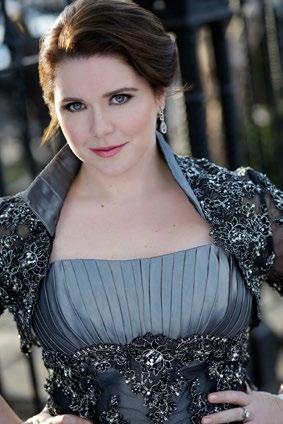
Highlights of recent seasons include her role debut as the title role in Iphigénie en Tauride, Cendrillon and Donna Elvira at the Opéra de Paris, as well as her role debut as Maria Stuarda at the Irish National Opera. Tara was a member of the Opera Studio and the ensemble of the Bavarian State Opera and is a regular guest in Munich, where she was most recently celebrated as Rosina
and Adalgisa (Norma). Other roles in Munich have included Susanna, Despina, Hänsel, Orlofsky, Sesto, Angelina (La Cenerentola), Roméo, and Kathleen Scott in the successful world premiere of Srnka’s opera South Pole. At the Metropolitan Opera New York she was celebrated as Nicklausse (The Tales of Hoffmann) and Hänsel (Hänsel und Gretel ).
Tara made guest appearances at the Vienna State Opera as Donna Elvira, Komponist and Rosina. As Angelina in the new production of La Cenerentola , she was hailed as the ‘new bel canto queen’ by the Frankfurter Allgemeine Zeitung. She made her debut at the 2016 Salzburg Festival as Siebel in Gounod’s Faust. At the Baden-Baden Festival Theatre, she sang Annio (La clemenza di Tito) under Yannick Nézet-Séguin. In Hamburg, she made her debuts as Fiordiligi (Così fan tutte), Alice (Falstaff ) and Vitellia (La clemenza di Tito). She was Artist-in-Residence at the Glimmerglass Festival 2024 where she sang the title part in Elizabeth Cree and gave a masterclass for young singers.
Tara has also given recitals at Wigmore Hall in London, at the Schubertiade, in Munich, Barcelona, Oxford and Eppan. A special honour was the invitation to the jubilee song recital to celebrate the 100th birthday of Victoria de los Angeles in Barcelona, which she also presented at London’s Wigmore Hall. Concert engagements have taken her to the Bavarian Radio Symphony Orchestra under Herbert Blomstedt, the Minnesota Orchestra under Simone Young, and a Mozart gala with the Munich Radio Orchestra under Alexander Soddy. The artist performed in Beethoven’s Ninth Symphony in Duisburg under the baton of Eun Sun Kim. Her international concert activities have also taken her to New York’s Carnegie Hall, the Kennedy Center in Washington, the Pittsburgh Symphony Orchestra, Vancouver, Savannah, Indianapolis, Milwaukee, Dublin, Lyon and Tokyo. She sang Mozart’s Requiem with the Philadelphia Orchestra under Yannick Nézet-Séguin.
Born in Dundalk, Ireland, Tara Erraught graduated from the Royal Irish Academy of Music in Dublin. She works regularly with Brigitte Fassbaender.
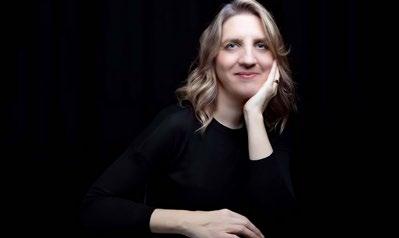
Dearbhla Collins pianist
Dearbhla Collins is one of Ireland’s finest musicians. She enjoys collaborating with singers who have a real passion for song. These include Sir Thomas Allen, Sir Simon Keenlyside, Tara Erraught and Nicky Spence. Her performances have taken her to the US, China, Japan, and many European countries. Venues she has performed in include Wigmore Hall, London, the Hill Auditorium, Ann Arbor, Michigan, the Lincoln Center, New York, and festivals including Blackwater Valley Opera Festival and Dublin International Chamber Music festival.
Dearbhla is Artistic Director of the Veronica Dunne International Singing Competition. She is passionate about mentoring young vocal talent and is Artistic Consultant at the National Opera Studio, London. She has for many years been a vocal coach at the Royal Irish Academy of Music, and is also visiting coach to Mascarade Opera Studio, Florence and the YAP Opera Academy of the Polish National Opera, Warsaw. She has given masterclasses and workshops to singers in Beijing, Shanghai and Wuhan, China, in the Royal College of Music, London, Guildhall School of Music and Drama, London, Royal Northern College of Music, Manchester and Opera North, Leeds.
Dearbhla founded Dublin Song Series in 2013 and continues to curate it in partnership with the National Concert Hall and the Hugh Lane Gallery. The concerts in 2024-2025 at the NCH feature mezzo-soprano Paula Murrihy and the Irish debut performances of American baritone, Sean Michael Plumb, and the tenor, Anthony Leon, winner of Operalia Competition 2022.
In October 2017 she was awarded an honorary doctorate for her services to music in Ireland from the National University of Ireland.
Morgane Fauchois pianist
French pianist Morgane Fauchois’s career has taken her from opera theatres to concert stages, vocal recitals and chamber music projects.
She collaborates with internationally acclaimed singers including Roberto Alagna, Aleksandra Kurzak, Rolando Villazón, Natalie Dessay, Tara Erraught, Joseph Calleja, Véronique Gens, and Karine Deshayes.
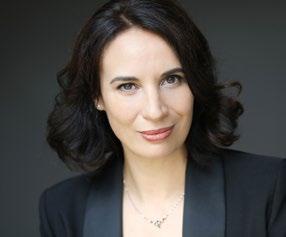
With a repertoire spanning late Baroque to new music, she works as a coach for Opéra de Paris, Théâtre des Champs-Élysées, Opéra-Comique, Théâtre du Châtelet, opera companies in Lyon, Amsterdam, Antwerp, Tel Aviv and Riga, as well as renowned festivals such as Salzburg and Aix-en-Provence, collaborating with conductors such as Louis Langrée, Carlo Rizzi, Daniele Gatti, Alain Altinoglu, Thomas Hengelbrock, Peter Eötvös and Marc Minkowski.
Alongside her activity as a coach and collaborative pianist, Morgane is also an avid chamber music player, particularly with musicians from the Orchestre de Paris, an orchestra with which she also performs as pianist and harpsichordist.
Morgane graduated with high honours from the Paris Conservatoire in piano, chamber music and vocal accompaniment, and completed her studies under the tutelage of Dominique Merlet in Geneva, where she received a postgraduate diploma as a solo pianist.
Morgane Fauchois was a member of the Young Artists Program at Paris Opera, and was awarded first prize in opera coaching at the International Belvedere Competition in Vienna.
Committed to nurturing the next generation, Morgane is now on the faculty of the vocal department at Paris Conservatoire, where she has also been appointed head coach for opera productions.
Dr. Paul E. Kwak laryngologist
Dr. Paul E. Kwak is a laryngologist and laryngeal surgeon at the NYU Voice Center, and Assistant Professor in the NYU Department of Otolaryngology-Head and Neck Surgery, specializing in care of the professional voice and phonomicrosurgical resection of benign vocal fold lesions. He treats patients with vocal cord cancer, vocal cord paralysis, and laryngeal papilloma, and is experienced in surgical techniques for laryngeal microsurgery and use of the KTP laser.

Dr. Kwak completed his clinical fellowship in laryngeal surgery with Dr. Steven Zeitels at the Massachusetts General Hospital, and his residency in otolaryngology-head and neck surgery at Baylor College of Medicine and MD Anderson Cancer Center. He is also a graduate of the Juilliard School, where he earned a Master’s degree in Collaborative Piano with Margo Garrett, studying vocal accompanying and opera coaching.
In 2003, Kwak graduated magna cum laude from Harvard University, where he studied the history of medicine and medical ethics and wrote an honours thesis on the history of trust in the physician-patient relationship. Kwak spent a year abroad at Oxford University, on fellowship from Harvard, where he earned a Master’s degree in Comparative Social Policy, writing an honours dissertation on patients’ rights legislation in the United States and in the United Kingdom. In February 2006, Kwak was awarded the Paul and Daisy Soros Fellowship for New Americans, and in May 2006, the Helen Fay Prize for Outstanding Pianist at Juilliard. He is a graduate of Case Western Reserve University School of Medicine.
Dr. Kwak’s clinical and research interests centre on the care of the professional voice, and his most recent publications examine physiologic and acoustic effects of opera performance, in ongoing collaborations with the Juilliard School, the Metropolitan Opera, New York University Tisch and Steinhardt Schools, and the Houston Grand Opera. Additionally, his work focuses on phonomicrosurgical approaches to benign subepithelial vocal fold pathology, paralytic dysphonia, and recurrent respiratory papillomatosis.
Alexander Neef Director General of the Paris Opera
Alexander Neef was born in Germany in 1974. He studied Latin Philology and Modern History at the Eberhard Karl University in Tübingen. In 2000, he began his career as production manager at the Salzburg Festival for two seasons, before joining the artistic administration of RuhrTriennale, a multidisciplinary festival where he was responsible for opera, theatre and dance productions as well as concerts and events. At the request of Gerard Mortier, then Director of Paris Opera, he joined the institution from 2004 to 2008 as Casting Director, also assisting Mortier in preparing his programming schedule for New York City Opera.
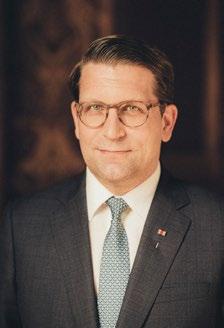
From 2008-2020, he was General Director of the Canadian Opera Company where he developed co-productions with, among others, the Metropolitan Opera, New York, London’s Royal Opera House, Madrid’s Teatro Real, the Aix-en-Provence Festival and Moscow’s Bolshoi Theatre. In Toronto, he welcomed world-renowned singers, conductors, directors and artists. Alexander also enabled the COC to return to the world-famous BAM (Brooklyn Academy of Music) in 2011 with Stravinsky’s The Nightingale & Other Short Fables, directed by Robert Lepage.
In Canada, he presented the world premieres of Barbara Monk Feldman’s Pyramus and Thisbe (2015) and Rufus Wainwright’s Hadrian (2018). During his tenure as Director of COC, he commissioned two new operas: The Old Fools by Ana Sokolovic’, and Julien Bilodeau’s La Reine Garçon. He brought new energy to the COC Ensemble Studio, a training programme for young opera professionals. In 2011 he launched a competition, inviting the public to attend singers’ final auditions, for the Ensemble Studio.
Alongside his management of the Canadian Opera Company, in 2018 he was appointed the first Artistic Director of Santa Fe Opera in the US. In 2019 he was appointed Director Designate of Paris Opera by Emmanuel Macron, President of the French Republic. He assumed his duties ahead of schedule on 1 September 2020.
Alexander was awarded the Order of Merit of the Federal Republic of Germany in 2018, and named Commander in the Order of Arts and Letters by the French Ministry of Culture in 2022.
Gaby Smyth financial and tax consultant
Gaby Smyth studied at UCD (BSc Hons, HDE), University of Limerick (M.A.), Leinster School of Music (LLSM), and is a Fellow of the Institute of Chartered Accountants, also qualifying as a Certified Mediator (CEDR, London). He has been in financial and taxation consultancy for over 30 years, specialising in the literary, music, film, theatre and visual arts – representing and advising many of the major Irish and international practitioners in these areas.
Gaby has also been involved in the leadership and governance of many arts organisations in Ireland; he has been the chairman of the boards of Temple Bar Gallery & Studios, Corn Exchange Theatre Company, and TEAM Educational Theatre Company. He was also chairman of the boards of the Dublin International Film Festival and Opera Theatre Company; and was inaugural chairman of Irish National Opera. Additionally, he was non-executive chairman of Boulder Media Ltd., a major Irish animation company, and the first independent chair of Screen Producers Ireland, the umbrella organisation for the film, animation and TV industry in the state.

He chaired the board of Amnesty International Ireland between 2001-2005, and again from 2010-2014. He was also chair of the International Chairs’ Forum for Amnesty International.
Andreas Massow artist manager
Andreas Massow was born in Hamburg. In his hometown he studied musicology, economics and sociology. During the course of his studies, he also gained experience at the Hamburg State Opera and Komische Oper Berlin, and graduated with a Master’s thesis on the subject of ‘Engelbert Humperdinck’s Königskinder Melodram und Oper’.

Andreas began his career in the Company Office of Frankfurt Opera in 2003. In 2012 he was appointed to the Zurich Opera as consultant for artistic planning and casting. In 2014, Andreas joined the Bavarian State Opera in Munich as Head of Casting. Andreas Massow has worked at ARSIS Artist Management in Vienna since 2019. He has recently been appointed Head of Artistic Direction at the Deutsche Oper, Berlin, a position he will take up at the beginning of the 2026-2027 season.
Liz Nolan presenter
Liz Nolan hails from Dublin and trained in voice, oboe and piano at the DIT Conservatory of Music and Drama and the Royal Irish Academy of Music. Following a degree in English Literature (TCD Hons) and M.Phil in Music (DIT/TCD), Liz was appointed academic lecturer and singing teacher at the DIT Conservatory of Music and Drama. A H.Dip in Arts Administration (UCD) led to Liz’s appointment as Education and Outreach Officer at the Association of Irish Choirs.
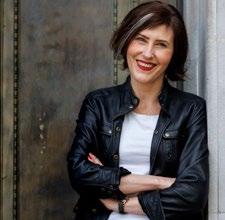
In 2001, RTÉ lyric fm beckoned. There, Liz has presented a wealth of key shows including Classic Drive, A World of Song, Lyric Notes and Lunchtime Classics. In 2015 she was awarded bronze for Best Overall Music Presenter at the prestigious PPI (now IMRO) Awards. She now presents The Full Score, 1-4pm weekdays on lyric. Alongside her strand work on radio, Liz has researched and presented numerous acclaimed arts radio features, which have received international broadcast. Liz is also well-known as presenter/MC at concerts and arts events around Ireland, in addition to roles as Music Club host and lecturer.
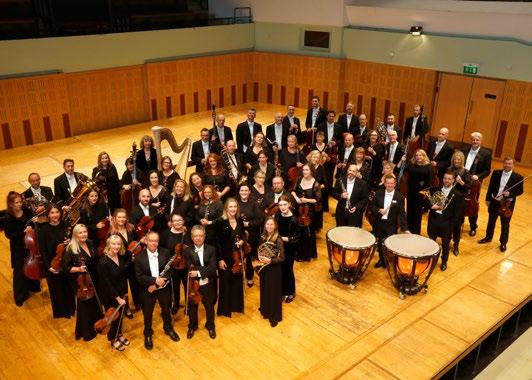
The National Symphony Orchestra has been at the centre of Ireland’s cultural life for over 75 years. Formerly the RTÉ National Symphony Orchestra, it was founded in 1948 as the Raidió Éireann Symphony Orchestra. In 2022, the Orchestra transferred from RTÉ to the remit of the National Concert Hall.
Resident orchestra of the National Concert Hall since its opening in 1981, it is a leading force in Irish musical life through year-long programmes of live music –ranging from symphonic, choral and operatic to music from stage and screen, popular and traditional music, and new commissions – alongside recordings, broadcasts on RTÉ and internationally through the European Broadcasting Union. Schools concerts, family events, initiatives for emerging artists and composers, collaborations with partner promoters and organisations extend the orchestra’s reach.
As a central part of the National Concert Hall’s 2024-2025 Season, the NSO presents more than 55 performances shared between Dublin, Galway, Limerick, Waterford and Cork. They include collaborations with international and Irish artists, ensembles and conductors – including a number of events with the National Concert Hall’s Artists-in-Residence: the renowned American musician and composer Bryce Dessner, the internationally acclaimed Irish mezzo-soprano Tara Erraught, and the dynamic musician and presenter Jessie Grimes. The programme is rich and varied, presenting repertoire from across the centuries to the present day including world and Irish premieres, choral masterpieces, birthday and anniversary celebrations, family concerts and screenings, schools concerts, and professional initiatives for emerging singers and composers. A focus on nature and the environment is a central part of the season’s programming.
Highlights with the Artists-in-Residence are many. They include three Irish premieres by Bryce Dessner: Mari , his Violin Concerto performed by its dedicatee, Pekka Kuusisto, and his Concerto for Two Pianos performed by Katia and Marielle Labèque, for whom it was written. Tara Erraught performs virtuosic works by Mozart, Haydn and Marianne von Martínez, with historical performance specialist Laurence Cummings conducting, and arias by Mozart, Puccini, Bellini, Donizetti and Rossini, with Clelia Cafiero conducting. Tara is also the driving force behind Celebrating the Voice, a week-long professional development programme for young singers which culminates in an opera gala with the NSO conducted by Anu Tali. Jessie Grimes leads immersive, family-friendly concerts including Our Precious Planet and explorations of iconic works: Beethoven’s Fifth Symphony and Berlioz’s Symphonie fantastique as part of the ASD-friendly Symphony Shorts , as well as Prokofiev’s Peter and the Wolf, featuring new and specially commissioned shadow puppetry, and Britten’s The Young Person’s Guide to the Orchestra.
Other exciting highlights include Dame Sarah Connolly joining conductor Mihhail Gerts for Alma Mahler’s Six Songs; an 80th birthday celebration for conductor Leonard Slatkin which includes the world premiere of his son Daniel’s cosmic journey, Voyager 130 ; Hugh Tinney performing Beethoven’s Fourth Piano Concerto; Speranza Scappucci conducting a Ravel Birthday Celebration; John Storgårds conducting Rachmaninov and Shostakovich; Anja Bihlmaier conducting Mahler’s Ninth Symphony; and Ryan McAdams conducting the First Violin Concerto by Philip Glass with NSO Leader Elaine Clark as soloist; and John Luther Adams’ Pulitzer Prize-winning Become Ocean. Jaime Martín returns
to conduct Chopin’s Second Concerto with Yeol Eum Son as the soloist, and former Principal Conductor Gerhard Markson returns for Stanford’s Requiem featuring the National Symphony Chorus and soloists including Máire Flavin and Sharon Carty. World premieres by Ailís Ní Ríain and, as part of Composer Lab, by Amelia Clarkson, Finola Merivale, Barry O’Halpin, and Yue Song all feature. Irish premieres include a new orchestral setting of Philip Glass’s film score Naqoyqatsi with the Philip Glass Ensemble; Stephen McNeff’s The Celestial Stranger with Gavan Ring as soloist; James MacMillan’s St. John Passion with the National Symphony Chorus and Chamber Choir Ireland; and Ukrainian Victoria Vita Polevá’s Third Symphony.
Additional family events include popular screenings of classic children’s stories by Julia Donaldson and Axel Scheffler – Stick Man and The Snail and the Whale – and Roald Dahl’s Revolting Rhymes . Music in the Classroom returns with Junior Cycle and Leaving Certificate Music Guide events, and Musical Adventures for Primary School children.
Other concerts include Martin Hayes with the National Symphony Orchestra , a major new collaboration with the renowned Irish fiddle player and composer centring around a reimagining with orchestra of his acclaimed 2023 Peggy’s Dream album; and, in partnership with esk film, in association with Netflix and Silverback Films, Life on Our Planet in Concert, presenting highlights from across the series on a big screen with Lorne Balfe’s dramatic soundtrack performed live to picture; and, in collaboration with Black Bear and A24, the debut screening of the acclaimed film Sing Sing with Artist-in-Residence Bryce Dessner’s score performed live.
1st Violin
Elaine Clark (Leader)
Stewart Webster
Sebastian Liebig †
Orla Ní Bhraoin °
Catherine Long
Ting Zhong Deng
David Clark
Bróna Fitzgerald
Sylvia Roberts
Claudie Driesen
Karl Sweeney
Molly O’Shea
2nd Violin
Ruth Funnell
Elizabeth McLaren ‡
Joanne Fleming Campbell °
Rosalind Brown
Dara O’Connell
Paul Fanning
Melanie Cull
Evelyn McGrory
Elena Quinn
Magda Kowalska
Viola
Felix Tanner
Francis Harte °
Robin Panter
Neil Martin
Nathan Sherman
Anthony Mulholland
Alison Comerford
Carla Vedres
Cello
Martin Johnson •
Polly Ballard ‡
Violetta-Valerie Muth °
Úna Ní Chanainn
Filip Szkopek
Maria Kolby Sonstad
Double Bass
Mark O’Leary •
Roger McCann
Waldemar Kozak
Jenni Meade
Flute
Catriona Ryan •
Sinéad Farrell †
Piccolo
Sinéad Farrell †
Oboe
Sylvain Gnemmi ‡
Ben Gannon
Cor Anglais
Ben Gannon
Clarinet
Seamus Wylie
Matthew Billing †
Bass Clarinet
Fintan Sutton †
Bassoon
Sinead Frost
Kristina Hedley
Horn
Helena Jacklin
Peter Ryan
Bethan Watkeys †
David Atcheler ◊
Dewi Jones
Trumpet
Pamela Stainer
Erick Castillo
Trombone
Jason Sinclair •
Gavin Roche ‡
Bass Trombone
Josiah Walters †
Tuba / Cimbasso
Francis Magee •
Timpani
Niels Verbeek
Percussion
Rebecca Celebuski •
Bernard Reilly ◊
Richard O’Donnell
Jun Bo Fu
Harp
Andreja Malir •
• Section Leader
† Principal
‡ Associate Principal
° String Sub Principal
◊
Sub Principal 1
NATIONAL CONCERT HALL
2024 — 2025 SEASON
INTERNATIONAL ORCHESTRAS AND RECITALS
























Gautier Capuçon and his cello ensemble



























Killian White guest cellist
Programme includes Piazzolla, Delibes, Bryce Dessner, Bartók, Bizet and Tchaikovsky
Acclaimed for his expressive musicianship and exuberant virtuosity, Gautier Capuçon – ‘among the greatest of cellists’ (The Arts Desk) –brings his Capucelli cello ensemble to the National Concert Hall with a programme to seduce and surprise.
WEDNESDAY 26 MARCH 8PM
Tickets from €15
Discounts and Packages Available nch.ie